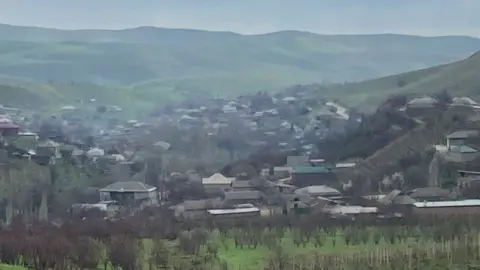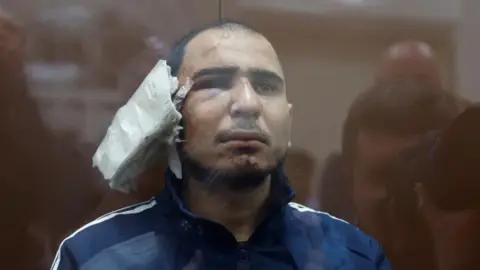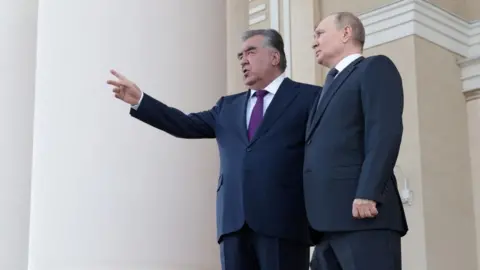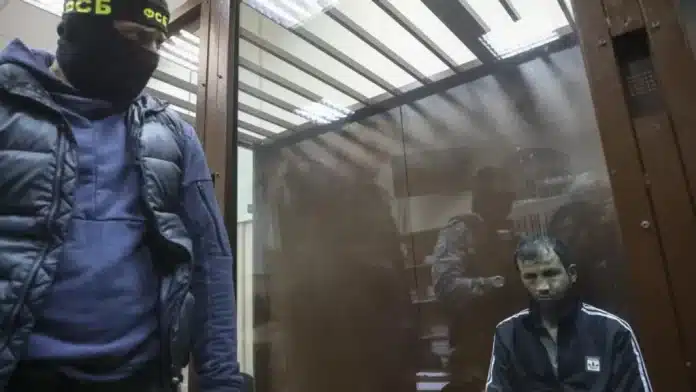In Loyob, they do not believe anyone from their village was capable of taking part in the jihadist massacre at Moscow’s Crocus City Hall.
But Faridun Shamsiddin is now one of four Tajik citizens held in a Moscow jail suspected of murdering at least 143 people last week. The 25-year-old is also accused of recruiting two other men to help the gunmen.
He left Loyob, about 40km north-west of the capital Dushanbe, several months ago in search of work in Russia.
Within hours of the Moscow attack, Tajik security forces were seen in Loyob and reportedly took the suspect’s father away for interrogation. Russian investigators are also said to have flown to Tajikistan to speak to relatives.
Jihadist group Islamic State said it was behind the Moscow attack and released footage verified by the BBC.
All four suspected attackers showed signs of torture when they appeared in court, raising serious questions about the reliability of their testimony.
However, Tajik President Emomali Rahmon has long drawn attention to extremism in areas of Tajikistan, especially among young people. He has condemned the Crocus City Hall attack as a shameful and terrible event.

Faridun Shamsiddin comes from this village, west of the Tajik capital, Dushanbe
At least nine people have been arrested this week by Tajik authorities, for alleged links to the Moscow attack suspects. All of them are described as residents of Vakhdat, a town east of Dushanbe that is home to another of the alleged attackers, Saidakram Rajabalizoda.
The other two have been named as Muhammadsobir Fayzov and Dalerjon Mirzoyev.
Young people in Loyob mainly work in agriculture, construction or in the local market. Like Shamsiddin, many travel to Russia to escape low wages and high levels of unemployment at home.
Tajik authorities say more than 652,000 people migrated to Russia last year, although Russia says the number could be in the millions.
One villager in Loyob, who asked not to be named, told the BBC that Faridun Shamsiddin had first emigrated to Russia six months ago. Three months later, he travelled to Turkey, before returning 11 days later in early March.
While he was there, he is thought to have met fellow suspect Saidakram Rajabalizoda.
 Reuters/Yulia MorozovaSaidakram Rajabalizoda showed cleared signs of torture when he appeared in court in Moscow on Sunday night
Reuters/Yulia MorozovaSaidakram Rajabalizoda showed cleared signs of torture when he appeared in court in Moscow on Sunday night
Turkey is a convenient country for a migrant worker to renew a Russian permit, but it is also seen as somewhere that IS’s Afghan-based affiliate Islamic State Khorasan can recruit militants.
In a three-minute video reportedly leaked by Russian security services, Faridun Shamsiddin is seen shivering while a soldier pushes his head against his boots, before he is heard saying he carried out the Moscow massacre in exchange for 500,000 roubles (£4,200).
“The security officers beat him and tortured him so much, he would have been ready to take responsibility for Lenin’s death,” one villager told me after seeing footage of Shamsiddin being interrogated online
The Tajik president has appealed to people to protect children and young people from the influence of radical groups and not let them “tarnish the good name of the Tajik nation”.
But the government in Dushanbe says most of the 2,000 citizens who joined Islamic State between 2014 and 2016 during the group’s rise to prominence were mainly recruited in Russia.
They tend to be migrant workers, lured via social media or messaging apps such as Telegram. Some of those accused of involvement in recent IS attacks have said they were approached on social media with promises of money.
 ALEXANDER SHCHERBAK/KREMLIN POOL/SPUTNIK/EPA-EFETajik President Emomali Rahmon (L) has condemned the Moscow attack as shameful
ALEXANDER SHCHERBAK/KREMLIN POOL/SPUTNIK/EPA-EFETajik President Emomali Rahmon (L) has condemned the Moscow attack as shameful
Qasimshah Iskandarov, head of the Dushanbe-based Centre for Afghanistan Studies, believes Central Asian migrant workers are susceptible to recruitment by radical groups.
Turkey in particular has become a logistical hub for IS, he says, because both Tajiks and Russians can travel there without a visa.
Migrant workers who go to Russia have three months to find a residence and a work permit, which costs around $430 (£340). To avoid paying, some head to Turkey ahead of the deadline and then go back to Russia.
Some immigrants leave Russia for Turkey before completing the three-month deadline, and re-enter Russia to avoid paying.
But many Tajiks are also radicalised in Afghanistan, says Qasimshah Iskandarov. It is just a few hours’ drive south from Dushanbe and he says it has become IS’s primary base since the Taliban returned to power in August 2021.
Since last summer, Tajik militants have been linked to a spate of jihadist attacks.
The Russian-led military bloc, the Collective Security Treaty Organization (CSTO), which includes Tajikistan, said last month it had observed an increase in the number of IS fighters and other Islamist militants on its southern borders
The CSTO says the network of training camps for groups such as IS and al-Qaeda is expanding and the majority of their foreign fighters are concentrated in the northern regions of Afghanistan, bordering Tajikistan.

